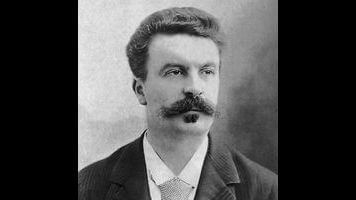A fresh translation unearths a troubled master’s take on mortality and jealousy

The 19th century French writer Guy De Maupassant was one of the masters of the golden age of the short story, but he also wrote half a dozen novels, the most famous of which is probably Bel Ami, about a man who heartlessly manipulates his way to the top of Parisian society. Like Death, newly translated by the poet Richard Howard (esteemed translator of Charles Baudelaire, Roland Barthes, Michel Foucault, and many others), is a lesser-known and more unconventional short novel, even if it shares its dramatic ironies and obsessions with sex, success, mustaches, and skin with the rest of Maupassant’s fiction. The title, previously translated as Strong As Death, is perfect—not only because of the novel’s morbid portrayal of subsumed jealousy, anxiety, and lust, but because it is a simile. That are passages in Like Death where every sentence has a “like” or an “as if” in the middle of it, conjuring one comparison after another into a séance of bizarre images: “Kneeling on the floor like a Turk, he seized the one visible shoe and pulled it off. Released from its leather sheath, the foot squirmed like a restless little animal astonished to find itself free.”
There is a constant sense of surprise and discovery to Maupassant’s descriptions, which consume the almost completely interiorized narrative, itself propelled by a kind of simile: the resemblance of an aristocratic debutante named Annette De Guilleroy to a younger version of her mother, Anne, who has been carrying on an affair for many years with the middle-aged painter Olivier Bertin. First published in 1889, Like Death came toward the end of Maupassant’s productive but brief career as a writer, as he was succumbing to mental illness and syphilis. He would spend the next few years trapped in depression and paranoid delusion, and, after slitting his throat with a letter opener, was committed to a sanatorium, where he died in 1893. One might argue that there is a vein to deep unease in Maupassant’s later prose; like so many writers of his time, he often refers to women as “creatures” in Like Death, but the choice of word does not seem casual. (He also wrote his share of horror fiction, included the classic “The Horla,” which had a profound influence on H.P. Lovecraft.) In Like Death, he writes of the inevitable comparisons between Anne and her daughter: “Fixed ideas have the gnawing tenacity of incurable diseases.”
The short but too academic foreword that Howard provides for New York Review Books’ new edition compares the impressionistic prose of the novel to the work of Marcel Proust. But one is, in an unexpected way, reminded of Herman Melville, whose metaphors and detours served to stage. In affairs, cuckolds, gossip, and manners, Maupassant finds an inexhaustible source of comparisons; he is reminded of everything by this social cosmos, and so it is everything, in a way. The everyday fact of a daughter resembling her mother poisons the relationship between the two lovers, drawing out their worries about mortality and lost youth. It is effectively a psychological novel, but one rendered entirely in reminders and turns of phrase. And yet, for all of its neuroticism, it retains the lucid wit that made Maupassant such a tremendous writer of short fiction—the way he sums up a minor character as “a clever old man who might become a famous one, and who remained inconsolable for what he had not achieved.” Morose obsession hides behind the gaze of a keen social observer.
Purchase Like Death here, which helps support The A.V. Club.